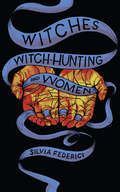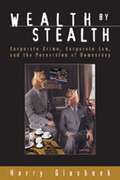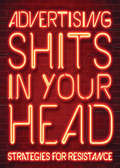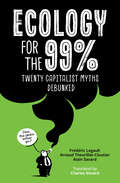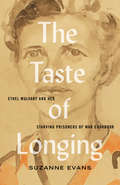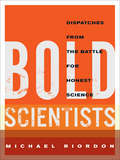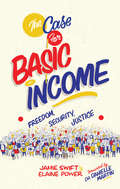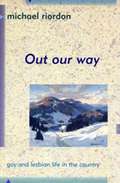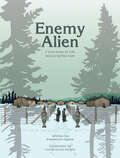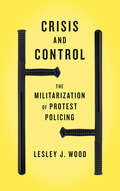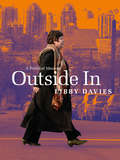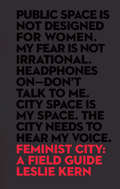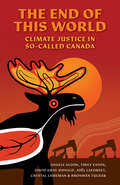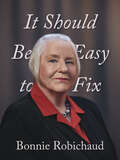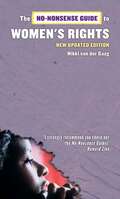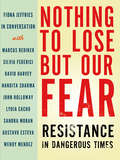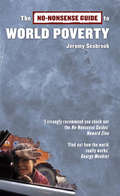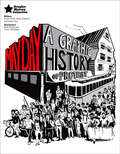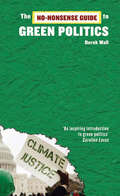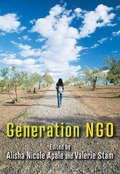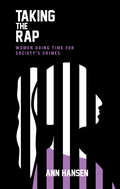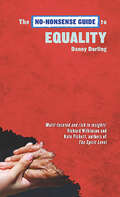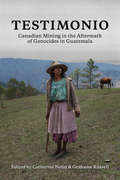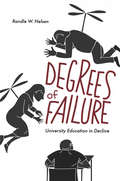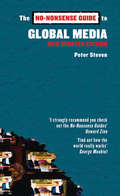- Table View
- List View
Witches, Witch-Hunting, and Women: 100 Notes, 100 Thoughts: Documenta Series 096
by Silvia FedericiWe are witnessing a new surge of interpersonal and institutional violence against women, including new witch hunts, which have occurred alongside an expansion of capitalist social relations. In this new work Silvia Federici revisits some of the main themes of Caliban and the Witch, examining the root causes of these developments and outlining the consequences for the women affected and their communities. No less than the witch hunts in sixteenth-and seventeenth-century Europe and the “New World,” this new war on women is a structural element of the new forms of capitalist accumulation founded on the destruction of people’s most basic means of reproduction.
Wealth By Stealth: Corporate Crime, Corporate Law, and the Perversion of Democracy
by Harry GlasbeekHow is it that corporations are able to behave irresponsibly, criminally, and undemocratically? Wealth by Stealth is a scathing introduction to the operations of the modern corporation, written by a corporate lawyer. Many writers point to the growth of undemocratic corporate power. Glasbeek takes these observations further and outlines clearly how corporations become so powerful. He also shows how they are able to act without regard to the behaviour and laws governing citizens and other groups. Glasbeek is known by generations of students for his brilliant, funny lectures at Osgoode Hall Law School. With Wealth by Stealth his informative critique of corporate behaviour becomes available and accessible to all. How is it “The corporation makes them do it”?
Advertising Shits in Your Head: Strategies for Resistance
by Vyvian RaoulAdvertising Shits in Your Head calls ads what they are—a powerful means of control through manipulation—and highlights how people across the world are fighting back. It diagnoses the problem and offers practical tips for a DIY remedy. Faced with an ad-saturated world, activists are fighting back, equipped with stencils, printers, high-visibility vests, and utility tools. Their aim is to subvert the advertisements that control us. With case studies from both sides of the Atlantic, this book showcases the ways in which small groups of activists are taking on corporations and states at their own game: propaganda. This is a call-to-arts for a generation raised on ads. Beginning with a rich and detailed analysis of the pernicious hold advertising has on our lives, the book then moves on to offer practical solutions and guidance on how to subvert the ads. Using a combination of ethnographic research and theoretical analysis, Advertising Shits in Your Head investigates the claims made by subvertising practitioners and shows how they affect their practice.
Ecology for the 99%: Twenty Capitalist Myths Debunked
by Frédéric Legault Arnaud Theurillat-Cloutier Alain SavardIf everyone—from Emmanuel Macron to Jeff Bezos, and even Coca Cola—is green, why is the environmental crisis growing at an alarmingly rapid rate? The world is already experiencing the impact of climate crisis, but we are not equally responsible for its violent effects. Some of those who claim to be helping the planet are actually making things worse. To avoid being duped by false allies and to create an ecology for the 99%, we must discuss a radical topic: the exit from capitalism. Ecology for the 99% provides inspiration for building grassroots environmental movements through a lively discussion of the most persistent capitalist myths. It presents compelling evidence for why carbon market policies will fail, why a capitalist economy cannot be based on renewable energy sources, and why we should be protesting against overproduction, not overconsumption. Ecology for the 99% is an antidote to apathy and a bulwark against false leads. Time is running out, we can’t afford to take any wrong turns.
The Taste of Longing: Ethel Mulvany and Her Starving Prisoners of War Cookbook
by Suzanne EvansHalf a world away from her home in Manitoulin Island, Ethel Mulvany is starving in Singapore’s infamous Changi Prison, along with hundreds of other women jailed there as POWs during the Second World War. They beat back pangs of hunger by playing decadent games of make-believe and writing down recipes filled with cream, raisins, chocolate, butter, cinnamon, ripe fruit – the unattainable ingredients of peacetime, of home, of memory. In this novelistic, immersive biography, Suzanne Evans presents a truly individual account of WWII through the eyes of Ethel – mercurial, enterprising, combative, stubborn, and wholly herself. The Taste of Longing follows Ethel through the fall of Singapore in 1942, the years of her internment, and beyond. As a prisoner, she devours dog biscuits and book spines, befriends spiders and smugglers, and endures torture and solitary confinement. As a free woman back in Canada, she fights to build a life for herself in the midst of trauma and burgeoning mental illness. Woven with vintage recipes and transcribed tape recordings, the story of Ethel and her fantastical POW Cookbook is a testament to the often-overlooked strength of women in wartime. It’s a story of the unbreakable power of imagination, generosity, and pure heart.
Bold Scientists: Dispatches from the Battle for Honest Science
by Michael RiordonAs governments and corporations scramble to pull the plug on research that proves that they are poisoning our planet and rush to muzzle the scientists who dare to share their disturbing data, it seems the powerful have declared a war on science. Michael Riordon asks deep questions of bold scientists who defy the status quo including: an Indigenous biologist who integrates traditional knowledge and a trickster’s wit; an engineering professor who exposes the myths and dangers of fracking; a forensic geneticist who traces children stolen by the military in El Salvador; a sociologist who investigates the lure and threat of mass surveillance; a radical psychologist who confronts psychiatry’s dangerous power; and a young marine biologist who risks her career to defend science and democracy. Who controls science and at what cost to the earth and its inhabitants? Can we change? This is unspun science for dangerous times.
The Case for Basic Income: Freedom, Security, Justice
by Jamie Swift Elaine PowerInequality is up. Decent work is down. Free market fundamentalism has been exposed as a tragic failure. In a job market upended by COVID-19—with Canadians caught in the grip of precarious labour, stagnant wages, a climate crisis, and the steady creep of automation—an ever-louder chorus of voices calls for a liveable and obligation-free basic income. Could a basic income guarantee be the way forward to democratize security and intervene where the market economy and social programs fail? Jamie Swift and Elaine Power scrutinize the politics and the potential behind a radical proposal in a post-pandemic world: that wealth should be built by a society, not individuals. And that we all have an unconditional right to a fair share. In these pages, Swift and Power bring to the forefront the deeply personal stories of Canadians who participated in the 2017–2019 Ontario Basic Income Pilot; examine the essential literature and history behind the movement; and answer basic income’s critics from both the right and left.
Out Our Way: Gay and Lesbian Life in the Country
by Michael RiordonMichael Riordon celebrates the survival of ordinary, extraordinary people whose experiences are rarely reflected in the media. These stories of courage and humour were gathered in the course of two years and 27,000 kilometres of travel, and some three hundred in-person conversations.
Enemy Alien: A True Story of Life Behind Barbed Wire
by Kassandra LuciukThis graphic history tells the story of Canada’s first national internment operations through the eyes of John Boychuk, an internee held in Kapuskasing from 1914 to 1917. The story is based on Boychuk’s actual memoir, which is the only comprehensive internee testimony in existence. The novel follows Boychuk from his arrest in Toronto to Kapuskasing, where he spends just over three years. It details the everyday struggle of the internees in the camp, including forced labour and exploitation, abuse from guards, malnutrition, and homesickness. It also documents moments of internee agency and resistance, such as work slowdowns and stoppages, hunger strikes, escape attempts, and riots. Little is known about the lives of the incarcerated once the paper trail stops, but Enemy Alien subsequently traces Boychuk’s parole, his search for work, his attempts to organize a union, and his ultimate settlement in Winnipeg. Boychuk’s reflections emphasize the much broader context in which internment takes place. This was not an isolated incident, but rather part and parcel of Canadian nation building and the directives of Canada’s settler colonial project.
Crisis and Control: The Militarization of Protest Policing
by Lesley J. WoodCrisis and Control explains how neoliberal shifts in political and economic systems are militarizing the policing of protest. The book offers a way to understand the influence of political processes on police practices and provides an empirical study of militarized protest policing from 1995 until the present. Lesley J. Wood shows how protest policing techniques have become more militarised and more dependent on intelligence gathering over the past fifteen years partly as a result of the neoliberal restructuring political, economic and social processes. On an increasingly integrated and tumultuous globe, new militarized technologies, formations and frameworks are diffusing quickly through policing networks. Crisis and Control uses novel theoretical and methodological approaches and a unique range of empirical data to make an important and radical contribution to a growing field.
Outside In: A Political Memoir
by Libby DaviesLibby Davies has worked steadfastly for social justice both inside parliament and out on the streets for more than four decades. At nine-teen, Davies became a community organizer in Vancouver’s Downtown Eastside. She went on to serve in municipal and then federal politics, advancing to the role of Deputy Leader of the New Democratic Party. Davies looks back on her remarkable life and career with candid humour and heart-rending honesty. She addresses the challenges of her work on homelessness, sex workers’ rights, and ending drug prohibition. She illuminates the human strengths and foibles at the core of each issue, her own as well as those of her colleagues and activist allies. Davies’ astute political analysis offers an insider’s perspective that never loses touch with the people she fights alongside. Outside In is both a political and personal memoir of Davies’ forty years of work at the intersection of politics and social movements.
Feminist City: A Field Guide
by Leslie KernLeslie Kern wants your city to be feminist. An intrepid feminist geographer, Kern combines memoir, theory, pop culture, and geography in this collection of essays that invites the reader to think differently about city spaces and city life. From the geography of rape culture to the politics of snow removal, the city is an ongoing site of gendered struggle. Yet the city is perhaps also our best hope for shaping new social relations based around care and justice. Taking on fear, motherhood, friendship, activism, and the joys and perils of being alone, Kern maps the city from new vantage points, laying out a feminist intersectional approach to urban histories and pathways towards different urban futures.
The End of This World: Climate Justice in So-Called Canada
by Angele Alook Emily Eaton David Gray-Donald Joël Laforest Crystal Lameman Bronwen TuckerThe climate crisis is here, and the end of this world—a world built on land theft, resource extraction, and colonial genocide—is on the horizon. In this compelling roadmap to a livable future, Indigenous sovereignty and climate justice go hand in hand. Drawing on their work in Indigenous activism, the labour movement, youth climate campaigns, community-engaged scholarship, and independent journalism, the six authors challenge toothless proposals and false solutions to show that a just transition from fossil fuels cannot succeed without the dismantling of settler capitalism in Canada. Together, they envision a near future where oil and gas stay in the ground; where a caring economy provides social supports for all; where wealth is redistributed from the bloated billionaire class; and where stolen land is rightfully reclaimed under the jurisdiction and sovereignty of Indigenous peoples. Packed with clear-eyed analysis of both short- and long-term strategies for radical social change, The End of This World promises that the next world is within reach and worth fighting for.
It Should Be Easy to Fix
by Bonnie RobichaudIn 1977, Bonnie Robichaud accepted a job at the Department of Defence military base in North Bay, Ontario. After a string of dead-end jobs, with five young children at home, Robichaud was ecstatic to have found a unionized job with steady pay, benefits, and vacation time. After her supervisor began to sexually harass and intimidate her, her story could have followed the same course as countless women before her: endure, stay silent, and eventually quit. Instead, Robichaud filed a complaint after her probation period was up. When a high-ranking officer said she was the only one who had ever complained, Robichaud said, “Good. Then it should be easy to fix.” This timely and revelatory memoir follows her gruelling eleven-year fight for justice, which was won in the Supreme Court of Canada. The unanimous decision set a historic legal precedent that employers are responsible for maintaining a respectful and harassment-free workplace. Robichaud’s story is a landmark piece of Canadian labour history—one that is more relevant today than ever.
No-Nonsense Guide to Women’s Rights, 2nd edition (No-Nonsense Guides #27)
by Nikki van der GaagHas the battle for women'’s rights been won? As Niki van der Gaag points out, “it is easy to forget just how recently so many women’s rights have been won; and how many women still face violations of their rights on a daily basis.” In this No-Nonsense Guide, van der Gaag offers a status report on the women of the world by examining issues like health, poverty, politics, law, education, the environment, violence, and sexuality. And although we are not yet living in a “post-feminist” world and change is slow in coming, it is coming.
Nothing to Lose but Our Fear: Resistance in Dangerous Times
by Fiona JeffriesAs the Egyptian revolution gained momentum in the winter of 2011, a common refrain echoed across Cairo’s Tahrir Square: “The wall of fear came down!” Mass protests against fear and authoritarianism have also rumbled across the aggrieved streets and plazas of Tunis, Athens, Madrid, New York City, Istanbul, Rio de Janeiro, Mexico City, Delhi, and beyond. While the scale of these new uprisings may be unprecedented, the refusal of fear is not unique to our time. Nothing to Lose but Our Fear brings together an international group of scholars and activists and asks them how can we think critically and act productively in a world awash in fear. Their conversations with Fiona Jeffries provoke consideration of the often hidden histories of people’s emancipatory practices and offer reflections that can help us understand the conjuncture of systemic fear and resistance.
No-Nonsense Guide To World Poverty, 2nd Edition (No-Nonsense Guides #33)
by Jeremy SeabrookWhy are there so many people who are poor in a world that’s richer than ever before? Something must be wrong with conventional thinking about wealth and poverty. In this No-Nonsense Guide, Jeremy Seabrook summarizes his celebrated work on the meaning of poverty and draws on the experiences of people living in poverty all over the world. Seabrook asserts that the relatively poor majority of the world’s people do not actually want to be rich—in fact, they want to be safe. Giving voice to those whose views are rarely sought, this guide shows that the answers to world poverty lie not in economic growth and wealth creation, but in a radical reframing of how much is “enough” for our daily needs.
May Day: A Graphic History of Protest
by Robin Folvik Mark Leier Sean Carleton Graphic History CollectiveMay Day: A Graphic History of Protest traces the development of International Workers’ Day, May 1st, against the ever-changing economic and political backdrop in Canada. Recognizing the importance of work and the historical struggles of workers to improve their lives, with a particular focus on the struggles of May 1st, the comic includes the reader as part of this history, and the story concludes that “We are all part of this historical struggle; it’s our history and our future.”
No-Nonsense Guide to Green Politics (No-Nonsense Guides #13)
by Derek WallClimate chaos and pollution, deforestation and consumerism: the crisis facing human civilization is clear enough. But the response of politicians has been cowardly and inadequate, while environmental activists have tended to favour single-issue campaigns rather than electoral politics. The No-Nonsense Guide to Green Politics measures the rising tide of eco-activism and awareness and explains why this event heralds a new political era worldwide: in the near futurethere will be no other politics but green politics.
Generation NGO
by Apale, Alisha Nicole & Stam, ValerieYoung Canadians are increasingly active and engaged in global issues. Many are eagerly poised to contribute–in smaller and even larger ways–to international development and the Canadian national politics that, for better or worse, shape the field. Generation NGO captures some of the first impressions of these young international development professionals before they are relegated to the dusty corners of memory. It provides snapshots of some of their first experiences with inequality and poverty, power and privilege, stereotypes, identity, social location, prejudice, and injustice. It is as much about questions as it is about answers. These essays illustrate the continual negotiation of development workers in positioning and conducting themselves in a morally and ethically charged profession. A must-read collection for Canadians contemplating development work abroad, this collection will also provide food for thought for more seasoned veterans of NGO forays long after they have returned from the field.
Taking the Rap: Women Doing Time for Society’s Crimes
by Ann HansenWhen Ann Hansen was arrested in 1983 along with the four other members of the radical anarchist group known as the Squamish Five, her long-time commitment to prison abolition suddenly became much more personal. Now, she could see firsthand the brutal effects of imprisonment on real women’s lives. During more than thirty years in prison and on parole, the bonds and experiences Hansen shared with other imprisoned women only strengthened her resolve to fight the prison industrial complex. In Taking the Rap, she shares gripping stories of women caught in a system that treats them as disposable-poor women, racialized women, and Indigenous women, whose stories are both heartbreaking and enraging. Often serving time for minor offences due to mental health issues, abuse, and poverty, women prisoners are offered up as scapegoats by a society keen to find someone to punish for the problems we all have created.
No-Nonsense Guide to Equality (No-Nonsense Guides #6)
by Danny DorlingA wide-ranging exploration of why inequality persists and what can be done about it, the No-Nonsense Guide to Equality discusses the positive effects that equality can have, using examples and case studies from across the globe. It examines the lessons of history and covers race, gender and ethnicity, age, and wealth. Danny Dorling considers, realistically, just how equal it is possible to be, the challenges we face, and the factors that will lead to greater equality for all.
Testimonio: Canadian Mining in the Aftermath of Genocides in Guatemala
by Catherine Nolin Grahame RussellWhat is land? A resource to be exploited? A commodity to be traded? A home to cherish? In Guatemala, a country still reeling from thirty-six years of US-backed state repression and genocides, dominant Canadian mining interests cash in on the transformation of land into “property,” while those responsible act with near-total impunity. Editors Catherine Nolin and Grahame Russell draw on over thirty years of community-based research and direct community support work in Guatemala to expose the ruthless state machinery that benefits the Canadian mining industry—a staggeringly profitable juggernaut of exploitation, sanctioned and supported every step of the way by the Canadian government. This edited collection calls on Canadians to hold our government and companies fully to account for their role in enabling and profiting from violence in Guatemala. The text stands apart in featuring a series of unflinching testimonios (testimonies) authored by Indigenous community leaders in Guatemala, as well as wide-ranging contributions from investigative journalists, scholars, lawyers, activists, and documentarians on the ground. As resources are ripped from the earth and communities and environments ripped apart, the act of standing in solidarity and bearing witness—rather than extracting knowledge—becomes more radical than ever.
Degrees of Failure: University Education in Decline
by Randle W. NelsenIn Degrees of Failure, Randle Nelsen brings together such diverse topics as campus parking, college sports, helicopter parents, edu-business as edu-tainment, and technology in teaching to show how continuing inequities, grounded in large part upon social class differences, are maintained and reproduced in our universities. Paying special attention to the role played by professors in solidifying status quo arrangements, Nelsen makes the strange familiar for those outside the university bureaucracy and the familiar strange for those whose participation in university settings is a routine part of everyday life.
No-Nonsense Guide to Global Media, 2nd Edition (No-Nonsense Guides #9)
by Peter StevenPeter Steven explores the full spectrum of communications around the world, from the mega-corporations to the citizen reporters, from the newsrooms of Washington to the film industry of Nigeria. Steven examines the continuously shifting communications landscape, with a focus on how the media is responding to declining advertising revenues, social media sites, portable devices, and Asia’s growing influence and power. With an emphasis on diverse small-scale media production that exist only through their contact with specific audiences, Steven invites us to question how the media reflects society, and he asks: are we passive recipients? Or do we play a part in constructing our world?
